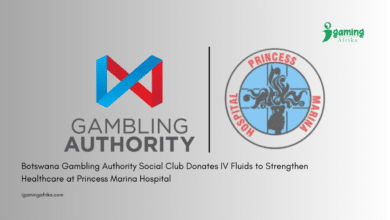Playing the Long Game: Strategies for Success in Africa’s Diverse iGaming Markets

Africa’s iGaming scene is heating up fast but beneath the excitement lies a maze of rules, regulations, and realities that can make or break a new entrant. Everyone wants a piece of the action, yet few understand the groundwork it takes to launch and operate successfully across such diverse markets.
That’s exactly what industry leaders explored during episode 28 of the iGaming AFRIKA webinar, “Demystifying the Requirements for Setting Up and Operating in Key African Markets.” Moderated by Zzini Ekeh and co-hosted by Jeremiah Maangi, CEO at iGaming AFRIKA, the session featured seasoned experts including Martin Sack, Co-Founder & Chief Strategy Officer at Gaming Advisory Partners (GAP); Job Weku, Business Development Manager at FAZI Company; Samuel Rowland, Chief Operating Officer at Lagos State Lotteries and Gaming Authority; and Brian Ondieki, an iGaming Consultant in Africa.
The panel offered candid insights on everything from licensing and taxation to local partnerships and market-specific nuances. They covered what it really takes to enter African markets, navigating multi-layered regulatory frameworks, adapting to regional cultures, and choosing the right partners. The verdict? Africa’s potential is undeniable, but success demands careful research, regulatory compliance, and a deep understanding of each market.
West Africa: Opportunities Amid Regulatory Complexity
West Africa presents significant opportunities for gaming investors, but the region is also characterized by regulatory complexity. Nigeria, one of the continent’s largest and most prominent gaming markets, exemplifies both the promise and the challenges of the region. A landmark Supreme Court ruling in November last year clarified that gaming regulation now falls within the jurisdiction of individual states, rather than the federal government. Each of Nigeria’s 36 states regulates gaming independently, meaning operators, investors, and service providers must secure state-specific licenses and comply with the unique requirements of their chosen jurisdiction.
Read Also: Supreme Court Ruling Empowers States to Regulate Lottery and Gaming in Nigeria
“Before now, it was the federal government and the state government that regulated gaming activities in Nigeria. Up until November last year, the Supreme Court gave the judgment that gaming activities fall within the purview of states, and the state should be the one to regulate gaming activities. So which means I, as an investor, can decide to say I’m coming into Nigeria, but I’ve done my research and I’m looking at which state I can start this business from, and I decide to either go to Lagos, to Oyo State, and all that. Now, each of these states has its own regulatory requirement,” commented Samuel.
To reduce the challenges of navigating multiple state regulations, several Nigerian states have collaborated to form the Federation of State Gaming Regulators of Nigeria (FSGRN), which can issue a single license valid across participating states. Rowland highlighted the practical benefits of this development: “Instead of applying for 10, 20, or even 30 state licenses individually, you can now obtain a single license that covers all participating states, streamlining your operations and enabling rapid growth. At the same time, the Central Gaming Bill seeks to establish a unified national framework. If passed, it could override aspects of the Supreme Court decision, illustrating how quickly regulatory conditions can evolve.
Taxation is another crucial factor, as operators are subjected to VAT, gaming taxes, withholding taxes on winnings, and corporate income tax, all varying depending on license type and state. In Nigeria, Samuel provided specifics on the complex landscape operators navigate, from VAT at 7.5% and withholding tax on winnings at 5%, to Lagos State gaming taxes ranging from 2.5% to 11% of GGR depending on license type, alongside company income tax of 20–30%. Recent reforms announced by the FSGRN, effective from January 1, 2026, will standardize this to a flat rate of 11% on GGR across all gaming categories in the state.
Ghana, another key West African market, has attracted investor attention due to its growing gaming sector and evolving regulatory framework. Unlike Nigeria, Ghana operates under a centralized regulatory body, the Gaming Commission of Ghana which oversees both sports betting and casino operations. The country recently abolished the 10% betting tax, a move aimed at improving access for younger players.
Explaining the motive behind the abolition, Lamtiig Apanga, Managing Partner at Prestige Partners in a recent interview with iGaming AFRIKA said, “There was a survey, one of the key concerns from the youth was the burden of the betting tax. They felt it limited their access to a form of entertainment.”
East Africa: Mobile-First Markets and the Need for Localization
In East Africa, Kenya, Uganda, and Tanzania dominate the gaming conversation. Brian Ondieki noted that Kenya is largely a mobile-first market, with online platforms far outpacing physical betting shops. Uganda has a strong retail presence, while Ethiopia historically had many retail shops but recently implemented a ban, highlighting the volatility operators must navigate in the region.
Successful operators invest heavily in localization, ensuring platforms run smoothly on local internet infrastructure, payments are seamless, and customer care is responsive. Brian emphasized, “International brands often fail because they don’t adapt their customer service or product to local needs. Local languages, cultural references, and reliable payment systems are non-negotiable for scaling in East Africa.” Job Weku added, “…the product itself, payments, customer care—these are aspects new operators must get right. Players turn off if the response comes after 2–3 hours.”
Taxation is a key consideration for operators entering East Africa. As the panel noted, countries like Kenya impose multiple levies, including VAT, withholding taxes on winnings, license fees, and PAYE for employees. Under the Finance Act 2025 in Kenya, the excise duty on bets was reduced from 15% of the amount wagered to 5% of funds deposited into a player’s betting wallet, while the withholding tax on withdrawals was lowered to 5% from the previous 20% on net winnings. Licensed operators also remain liable for a 15% gaming tax on gross gaming revenue and 30% corporate income tax on profits. Recently, under the Gambling Control Act 2025, Kenya introduced mandatory SHIF and pension deductions making gambling costlier.
Brian underscored the evolving nature of African taxation: “If you look across Africa, most countries are trying to get the right way of taxing the gaming industry. The African gaming market is less than 15 years old in most of these countries, so regulators and governments are still learning, trying to find ways of collecting taxes from these industries. Let’s give them time, and I’m sure in the next five years we could have a stable taxation environment across Africa.”
Operators must integrate these costs into their business models from day one to ensure profitability. Licensing structures differ widely by country and type, and as Job noted, “Some licenses cover only sports betting, while others include online casino. Misunderstanding the coverage can be costly, so proper planning is essential before entering the market.” Smooth platform performance, frequent wins, and a localized user experience remain central to player retention in the region. As Brian noted, “Accessibility, payment reliability, and a tailored experience directly influence whether players return.”
Southern Africa: Established Hubs and Emerging Opportunities
Southern Africa offers a diverse landscape for gaming operators, from mature markets like South Africa to emerging opportunities in Zambia, Angola, and Mozambique. Investors must prepare for varying levels of regulatory complexity, startup costs, and market competition. South Africa remains the most developed market in the region. According to Martin Sack, “One of the things I would advise clients coming into South Africa to operate is that 2–3 million dollars is probably the minimum investment. If they bring less than that, I personally think they’re going to lose their money. Of that number, about a third goes on staffing, a third on marketing, and the rest is made up of platform fees and other operational costs.”
Licensing in South Africa is relatively straightforward, though regulators require proof of funds or a bank guarantee to ensure operators can sustain their activities. Martin noted, “The boards do put requirements on operators to have a bank guarantee or funds in the bank, but that’s almost negligible in the greater terms of things. Getting to market and getting players in the door that gets expensive. The more we can do on that upfront, the better you are.”
South Africa’s gaming sector remains robust. The country was recently removed from the Financial Action Task Force (FATF) grey list, a move that boosted investor confidence. The market generated ZAR 75 billion in gross revenue on a total turnover of ZAR 1.5 trillion in the 2024/25 financial year, reflecting strong demand across both online and retail channels. Online betting, in particular, saw a 60% year-on-year growth in gross gaming revenue, fueled by high levels of internet penetration and the widespread adoption of mobile betting. The industry directly supported 33,160 jobs and contributed ZAR 5.8 billion in taxes and levies, underlining its significance as both an economic driver and a source of public revenue.
Read Also: South Africa’s Gambling Industry Surges to ZAR75Billion as Lawmakers Sound Alarm Over Black Market
Zambia is increasingly being recognized as a strong emerging market. Job Weku highlighted its potential: “Zambia is not slept on. We have big brands launching there; 888 Africa launched about two years ago and is doing well. We have brands like Bolabet doing very well too. Once you go below the top-tier markets like Kenya, Nigeria, and South Africa, Zambia is right below them in terms of potential. It’s also well regulated.”
Angola and Mozambique were highlighted as nascent but promising markets. Job explained, “These countries are gaining attention from operators exploring new frontiers. While regulations are still evolving, there’s growing gaming activity and opportunities for those who do their research and come prepared.”
Across Southern Africa, panelists emphasized that operational planning must account for multiple factors beyond licensing: staffing, marketing, platform costs, local adaptation, and regulatory compliance. As Martin summarized, “Getting to market with the right investment, the right staffing, marketing, and platform is critical. If you underprepare, you risk losing your investment before you even gain traction.”
Responsible Gambling and Data Protection
Panelists emphasized that responsible gambling and data protection are fundamental obligations for any operator in African markets. Samuel highlighted that, in Nigeria, operators must comply with frameworks covering both areas, “We also have responsible gaming regulation and the Nigerian Data Protection Act. Your job is to ensure registration and annual audit.”
Beyond Nigeria, operators are expected to align with similar standards across the continent, including Kenya’s Data Protection Act, South Africa’s Protection of Personal Information Act (POPIA), and regional AML/CFT regulations that overlap with player safety and transaction monitoring. Compliance with these frameworks ensures operators manage player information securely, uphold trust, and meet regulatory expectations from day one. Embedding responsible gaming and robust data protection is therefore essential to building credibility and sustainable operations in Africa.
Building Trust and Market Fit
Across Africa, a recurring theme is trust. Players expect platforms to pay winnings promptly and operate transparently. In Nigeria, Rowland noted, failure to deliver reliable payouts or ensure smooth gameplay can quickly erode a brand’s reputation. Similarly, he stressed that the frequency of winnings and accessible ticket purchase mechanisms play a key role in attracting and retaining players.
Emerging trends, including cryptocurrency, are also influencing market dynamics. With Kenya and Nigeria and most recently Ghana and Morocco drafting regulations for crypto platforms, operators who adapt early may gain a competitive advantage.
Read Also: Morocco Introduces Draft Law to Regulate Digital Assets
The Importance of Local Partnerships
Another clear takeaway from the webinar is that local partnerships are super essential. Across African markets, collaborating with locally registered entities provides critical insight into regulatory frameworks, consumer behavior, and cultural nuances. As Job Weku explained during the session, operators benefit from local expertise in ways that go far beyond legal requirements, “It’s critical to have good local partners to help navigate the regulatory bureaucracy and build a profitable business. They provide insights you simply cannot get from reading laws or reports.”
Martin Sack reinforced the point, highlighting how understanding local dynamics can mean the difference between success and failure, “You can’t just parachute in and expect success. You need people who understand the market, the language, and even the informal dynamics. That’s where local partnerships make the difference between surviving and thriving.”
Partnerships between international providers and local African operators have proven pivotal in shaping thriving gaming ecosystems across the continent. EGT Digital expanded its collaboration with Bangbet in Nigeria and Tanzania, giving players access to more than 140 popular slot titles. Kiron Interactive teamed up with SportPesa to launch its virtual football game Turbo League across Kenya and Tanzania. FAZI has accelerated its African expansion through content supply agreements with Odibets in Kenya and Chopbet across West Africa. Likewise, Booming Games has most recently partnered with SportPesa, delivering a wide array of mobile-optimized games to local audiences.
Rowland emphasized the importance of local partnerships saying it is important to work with people who understand the landscape. “It’s vital to work with people who understand the Nigerian market, not only the regulatory framework but also cultural norms and operational nuances. This ensures your business is set up correctly and can sustain itself.” These collaborations not only help operators navigate regulatory and technical requirements but also ensure platforms are adapted to local payment methods, network conditions, and player preferences.
Building for Longevity, Not Just Entry
Africa is not a single market but a continent of 54 countries, each with unique opportunities and challenges. While Nigeria, Kenya and South Africa often dominate the conversation, emerging markets like the DRC, Angola, and Mozambique are steadily gaining traction. Investors must avoid the common mistake of treating Africa as a monolith and instead approach each country with careful research, local expertise, and flexibility as no two African markets are the same. Brian stressed the importance of understanding these nuances: “You can’t apply a one-size-fits-all approach here. What works in Kenya may not fly in Tanzania or Zambia even within the same region, you’ll find completely different interpretations of what’s legal and what’s not.”
Panelists agreed that while regulatory complexity can be a barrier, it is not insurmountable. With proper planning, local partnerships, and market-fit strategies, Africa presents a promising landscape for gaming operators. As Samuel Rowland summarized, “The market is open, competitive, and growing. There are no monopolies, but with the right strategy and trust, the rewards can be significant.”
For those considering entry into the African market, the panelists encourage them to do their homework, understand local regulations, prioritize localization, and build trusted partnerships.
Africa is not one market it’s 54 unique opportunities, a continent to understand, respect, and grow with.























